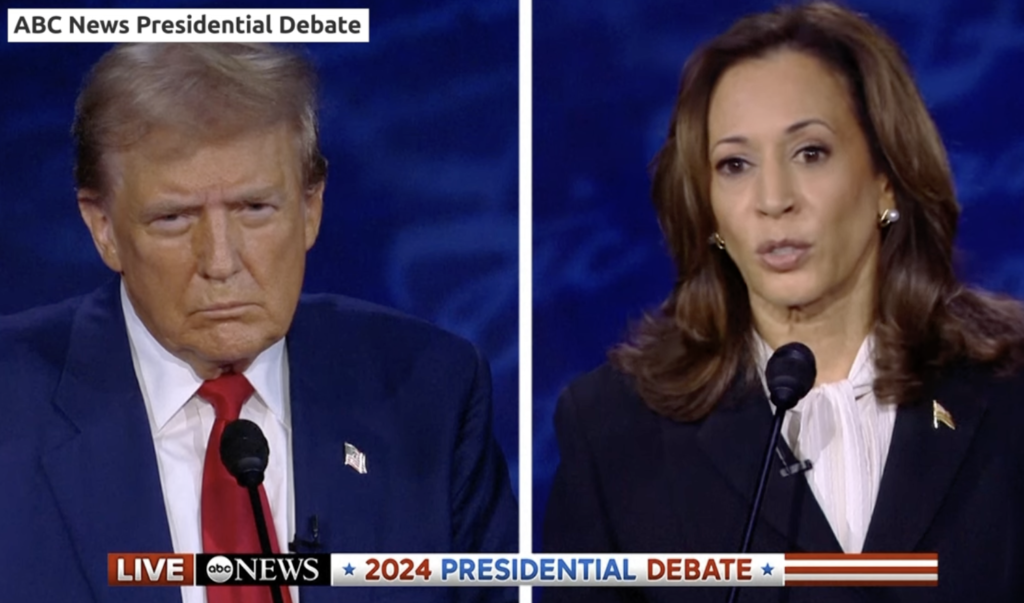With Mixed Feelings, I Vote for Harris

Ghassan Rubeiz / Arab America Contributing Writer
Recent presidential polls show that Vice President Harris and former President Trump are running neck and neck among Arab and Muslim Americans: 45% for Trump and 43% for Harris. Stunning New Poll Shows Trump Widening Lead Among Arab Americans | The New Republic. In 2024 the Arab and Muslim votes are more important than in the past because of the concentration of this minority group in the swing states, particularly in Michigan.
In recent elections, Arabs have voted primarily for the Democratic ticket. The shift to the Republican side among Middle Eastern voters is clear. It is not Donald Trump’s love for Arabs that has shifted voting patterns; it is Biden’s policy in the region. It is the carnage in Gaza at President Biden’s watch; his complicity in the bloodshed has contributed to the reversal of electoral loyalties.
Despite being frustrated with Biden’s Mideast policies, I vote for Kamala Harris. My top concern is the future of America, its overall policies, and its democracy. I am aware that President Biden and Vice President Harris – the 2024 presidential candidate- are responsible for supporting genocide against the Palestinians in Gaza and now for the savage Israeli attack on Lebanon. But as a mainstream American, multi-issue voter, I support Harris.
Perhaps the most disturbing element in Trump’s race for the presidency is not his flawed policies but his unwillingness to commit to accepting the results of the upcoming elections. If he loses, he will claim that the election process was rigged against him.
If there was any glaring feature characterizing failing states, they could not organize a peaceful transition of political power through elections. Not respecting election results is rejecting democracy. Donald Trump’s stubborn attitude toward the law threatens the stability of American society; he is also a symptom of America’s worsening polarization. My vote for Harris affirms America’s democratic institutions.
I try to understand why some Arab and Muslim Americans are voting for Trump. I listen intently to friends on different ideological wavelengths. Those opposing Harris have a variety of reasons for favoring Trump or for withdrawal from the ballot box. Many feel humiliated, traumatized, and cheated by the current administration.
Biden and Harris’s hypocrisy could feel more painful than tolerating Trump’s naivety. The humiliation of Arabs displayed daily in the media could feel worse than processing Trump’s transactional character. While President Biden and Vice President Harris have claimed to oppose Israel’s brutal conduct in the Gaza war, they, have blatantly supplied Israel with unlimited weapons and forceful diplomacy to justify the carnage and to save Israel’s reputation. For many in this group, the Middle East is the high priority, if not the single issue driving their vote.
Impressed by his rhetoric, some Arabs and Muslims feel that Trump would bring peace to the Middle East. They believe that the Democrats have fuelled wars in the Holy Land. In the Trump-for-peace group, voters are courted by one of Trump’s sons-in-law, Michael Boulos, who is of Lebanese descent. Jared Kushner, a Jewish Trump son-in-law, serves as a chief agent for promoting The Abraham Accords, a transactional agreement purportedly serving regional peace.
Some Arab and Muslim Americans are deeply-rooted Republicans; they support Trump on a partisan basis. They see Trump’s authoritarianism, deep tax cuts for the rich -and other pro-business policies- as good for America’s prosperity. For many conservatives, his rigid and simplistic views on social issues (e.g. abortion, gender and immigration) are on target.
If he wins, Trump will not be able to deliver on his promises. In my view, many Arab voters are ignoring, at a high cost, Trump’s psychological defensiveness and his limits in dealing with complex issues.
Recent polls show that Harris and Trump will each win a significant portion of the Middle East-oriented votes. Unlike previous presidential elections, this group’s current voting patterns are similar to those of the rest of America. Regardless of who wins, US policy in the Middle East will not radically change after the elections. I am as nervous about the way the transition of power takes place on inauguration day as I am about the race results.
As Arabs and Muslims are starting to make a difference in American politics, it is regretful to see their voice sharply split.
Ghassan Rubeiz is the former Middle East Secretary of the World Council of Churches. Earlier, he taught psychology and social work in his country of birth, Lebanon, and later in the United States, where he currently lives. For the past twenty years, he has contributed to political commentary and delivered occasional public talks on subjects related to peace, justice, and interfaith. You can reach him at rubeizg@gmail.com
The views and opinions expressed in this article are those of the author and do not necessarily reflect the position of Arab America. The reproduction of this article is permissible with proper credit to Arab America and the author.
Check out our Blog here!








